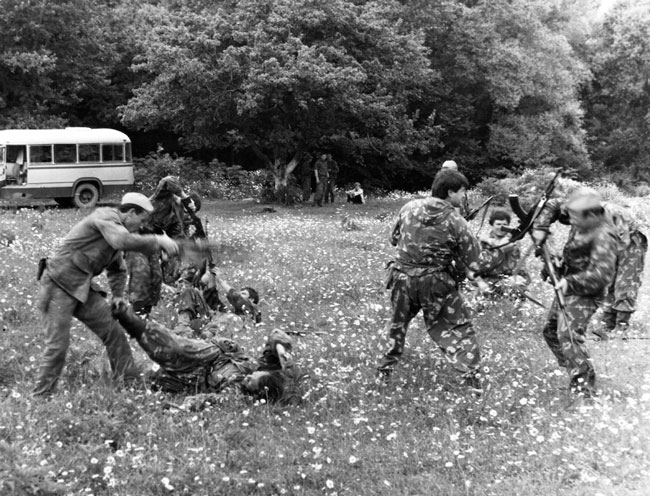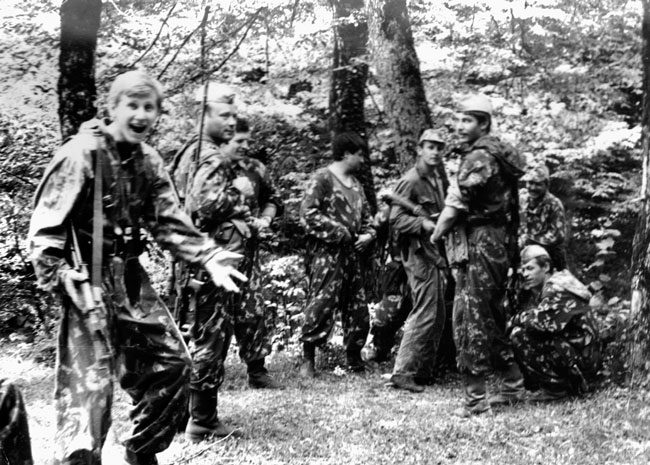This is Part 3 of a 3-part series on psychophysical training in the Kadochnikov System
[You are here] Part 1 – Psychophysical Training In The Kadochnikov System
Part 2 – How To Improve Your Psychophysical Condition In 5 Minutes
Part 3 – Building Up Psychological Strength In The Kadochnikov System
A fragment of a book by S.A. Vlasov “The green ghosts. The A.A. Kadochnikov group, 1984”
Nowadays a soldier is selected long before their service in Special Forces because not every good soldier is appropriate for such service.
There is a range of required standards and features to be considered: the psychological type, mental predispositions, adaptive traits, the ability to make an appropriate decision in difficult circumstances.
People who are unable to serve in Special Forces due to their professional qualities, moral and psychological or psychophysiological conditions are spotted in advance.
Due to this a considerable part of professional mistakes, nervous breakdowns and mental stress, which may occur during military or special operations, is averted.
Every candidate is estimated according to the following characteristics:
- system of values and laws (firmness of purpose, a professional call of duty);
- moral principles;
- motivation intensity (a freewill readiness to solve a complex professional task);
- intellectual faculties (general intelligence, operational thought and heuristic thinking);
- level of aspiration, accurate self-assessment, self-confidence, social maturity (responsibility, decisiveness in a complicated situation, a sense of reality, behavioral flection);
- resistance to mental and physical stress;
- level of self-control (self-command, even temper, composure).
While planning military operations it’s necessary for a commanding officer to know the capabilities of a soldier, his psychophysiological characteristics and human engineering data. It’s essential to know his limits.
Currently there exist most branches of sciences –
- physiology,
- psychology
– where all these things are carefully examined.
But in our case, it’s the other way round. First there is a will and then training.
As the training got more and more complicated and the candidates began to understand that they would soon face the real tasks, they dropped out naturally.

In the end, there was a psychologically stable and specially trained detachment formed, which was also functionally divided into autonomous groups of two or three for executing different operations and so on.
In general,
Psychophysical training is a complex of methods and actions taken in highly dangerous circumstances,..
which are connected with considerable physical and mental stress. In so doing a soldier enhances his mental stability against his physical development.
Alexei Alexeevich has also shared with us some psychophysical exercises (from the rough Special Forces set of exercises).
While doing this he maintained the core principle: the type of the surmounted obstacles should correspond to the coming reality.
While training psychological stability all efforts were put on making us accustomed to all sorts of unexpected situations and a state of anxiety.
- It’s well known that different extreme factors cause an extremely complicated stereotyped response of anxiety, which is characterized by the strong changes in motion activity, autonomic response and emotional state.
Anxiety is a stress component of a general adaptation mechanism, which is activated by the signals of danger, redistributes the vital functions in such an order that is essential for survival in extreme situations and further recovery of one’s organism.
In extreme situations a soldier tends to preserve one’s life and survive by activating the inborn programs of safety type behavior:
- attacks,
- defense,
- escape
- and conditioned reflex reactions acquired during regular training
- as well as will-power and psychological training.
The success of such behavior depends on:
- the experience in the correct assessment of a threat,
- skills,
- habits
- as well as will-power in order to get through a dangerous situation.
Panic and inadequate behavior is a result of the asthenic negative emotions when a person refuses to carry out his own scenario of events.
- It happens because of the disagreement between projection and reality.
Good will-power training (motivation) is the basis of a high-level demonstration of the physical qualities.

In order to cope with the consequences of the extreme effects and in order for a soldier to have combat readiness and good mental health…
It is necessary to recover hispsycho-emotional state…
…in time (pain relief or control, exhaustion, overcoming fear, despair, recovery of one’s will-power and self-confidence as well as normalization of muscles and internal functioning).
- All this was achieved by having regular relaxation training.
- It’s also because of Alexey Alexeevich who was always in the heart of forming the group.
He inspired us by personal example and supported us with any help we needed at the same time sharing with us roof and bread, like brothers do.
The main goal was accomplished. The soldiers of the group had their feeling of fear almost suppressed (without the use of any psychotropic or other substances).
- Everyone acquired self-confidence in one’s unlimited resources. We didn’t search for the already existed paths; we made new ones when it was necessary.
The topic of the psychophysical training in the Kadochnikov System is covered in great detail and step-by-step in one of the best video trainings for home use “The Psychological Training in the Kadochnikov System”, with the content of which you can get familiar on our web site right now by following the link below:


9 replies to "Psychophysical Training In The Kadochnikov System"
Can I purchase this system on physical CD or DVD..?
Hi! Unfortunatelly no
Articles like these put the consumer in the driver seat-very imttprano.
Excelent! As always of course.
[…] 1 – Psychophysical Training In The Kadochnikov System Part 2 – How To Improve Your Psychophysical Condition In 5 Minutes [You are here] Part 3 […]
[…] 1 – Psychophysical Training In The Kadochnikov System [You are here] Part 2 – How To Improve Your Psychophysical Condition In 5 Minutes Part 3 […]
Hi is the book by S.A. Vlasov “The green ghosts. The A.A. Kadochnikov group, 1984” available in English, by any chance?
THANK YOU and best wishes, stay safe
Frank
Hello! Unfortunately, there’s no English version of this book but we have another one: Kadochnikov System – Your Invisible Weapon: The Martial Art of 21 Century . Hope, you find it interesting!
Hi Gleb, ok, thanks, a pity. I already own the book you’ve mentioned as Kindle version. Have a great time, best wishes and BE SAFE and stay healthy,
Frank